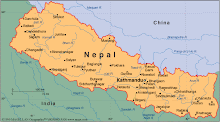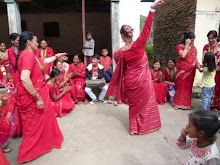
For the last couple of days I have been preparing myself (mostly mentally – travel + heat) for a trip to Dang, a region in Nepal very close to the Indian border. Dang is a day’s bus ride away from where I’m at and my organization has an office there. I hear it is beautiful there.
I was planning to spend a few days getting to know the staff, the office, and the programs. I’ve been feeling excited about going somewhere new again, and learning more about COSAN’s work with rural women in this area.
I received word today that my trip is cancelled, however – indefinitely for the moment – because of a banda (strike) that is planned for May 1st. It could be a relatively peaceful day long strike. Or it could be three weeks. We’ve been advised to stock up on food, just in case.
It’s a tenuous and critical time in Nepal politics right now. For folks who don’t know, Nepal was a Hindu kingdom for thousands and thousands of years and is only recently has adopted a secular government. The first free elections in Nepal were held in May of 1991, and there have been struggles for power and stability since. One of the main contenders for power over time has been the Maoist party, which currently holds seats within the parliament, but is also threatening a general governmental take-over.
The current government is under the wire right now to meet a deadline for the creation of Nepal’s constitution. The thinking is that if this constitution is drafted, there is a chance for real longer-term peace and some stability in Nepal. Or at least movement in that direction. But while anything could happen (and I’ve seen incredible things happen last minute here Nepal), the general sentiment seems to be that people believe the government won’t meet this deadline. And if they don’t, it’s hard to know what will happen.
I hear snippets of opinions and thoughts here and there about the political situation, but generally shy away from talking anything remotely political. For two reasons. One, VSO discourages (to put it lightly) volunteers from talking politics with anyone (for several good reasons). Second, I don’t have a firm grasp on the historical and current political situation here. Who is who, what is what. I feel like it is wise for me to generally just be quiet and watch how things unfold, gathering information how I can from the papers, the internet, and every once-in-awhile, from a friend who works for the UN. They are also careful what they share, though, of course.
It is hard for me to convey what it is like to live in a country where there are such frequent strikes, in combination with a general threat of strike at any time. Ironically, a strike day often means a day of quiet and peace. At least for me. Banda directly translates to closed. Everything just shuts down. There is absolutely no travel on roads allowed. Nobody, nowhere. Unless you are an ambulance. All stores and shops are closed. No restaurants. No shopping for food. The streets are totally quiet. Everyone stays home. Unless you can walk to work or bicycle to work, and if that is the case, you can go to work. Obviously, it’s hard on businesses.
While I generally envision strikes as peaceful days, here and there I encounter whiffs of violence. Some of my friends were in a café one day and were unfortunately in the wrong place at the wrong time, for instance. They got quite a scare when all the windows were smashed in by a group of young men with baseball bats. But were all luckily just fine – if not a bit shook up afterwards.
And when Brian and I were traveling back from our trekking trip to Kathmandu we watched the Energy Minister (so we were told) pass by on the road. Followed by a group of Maoists (not a homogenous group, by the way, a point I should make right here) running, waving black flags, and throwing rocks at the vehicle. Followed very closely by the police chasing right behind them. It was quite a sight.
I should mention at this point, however, that the only way to be unsafe during a strike is to a) enter into a big, angry crowd, b) to drive your car on the roads (it will likely get set on fire) or c) to have your business open when it’s supposed to be shut.
Since I walk and bike everywhere, live in a town that is known for being peaceful and safe, and don’t ever see angry crowds (let alone walk into them), strikes for me (and most) are just inconvenience.
There’s a strike somewhere, for something, almost every day in Nepal. Not always the Maoists, but often. I read a statistic that – out of 365 days last year – there were something like 357 days of strikes in 2009. While I can’t remember the exact number, I really am not exaggerating. While many of the strikes don’t affect the whole population (currently, for instance, all private schools in the area are shut by the Maoists for at least several days, because of disagreements about tuition raises), there are plenty of days when there are country- wide strikes.
People are nervous right now. It’s not am open topic of conversation in the Nepali circles I run in, but I can feel the nervousness. I can feel the anticipation of not knowing what is going to happen as the government approaches it’s big deadline. And I can feel that most people are worried about how it will go.
In the coming days I will prepare for a longer strike, just in case it happens. But, as I have experienced several times already, the strike could just as easily be short and quick, or be called off all together (even that morning). We’ll see. I, personally, am hoping for a simple, one day strike. That way, I can still travel to Dang next week, just in time to make it there before the rainy season starts…



No comments:
Post a Comment